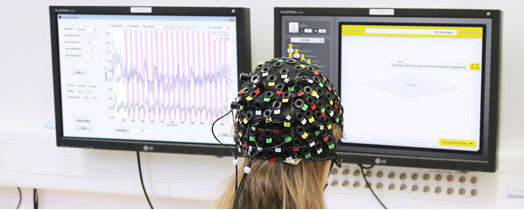NeuroLab is measuring brain activity as part of the EMOIO project that will run until the end of 2017. The project scientists use electroencephalography and functional near infrared spectroscopy to try and measure emotions, focusing on how far a combination of the two methods can improve the accuracy of classification algorithms that can enable emotion recognition in real time, during the interaction process.
As a first step, the different neuroscientific methods are being investigated, then the algorithms for real-time emotion recognition and classification will be improved. A brain-computer interface is being created that is capable of recording and evaluating users’ subjective feelings (approval/rejection) as to the appropriateness of system-initiated behaviors and feed this information back to an adaptive assistance system.

Credit: Fraunhofer-Institut für Arbeitswirtschaft und Organisation IAO
Using that data, the brain-computer interface enables assistance systems to adapt their behavior precisely to users’ individual preferences and needs. Neurophysiological feedback for the developed system does not require direct, active feedback so users are not interrupted during the interaction process.
The system will be tested in three different fields of application, where it will be integrated into an adaptive web interface, a driver assistance system, and a system for human-robot cooperation.






Comments